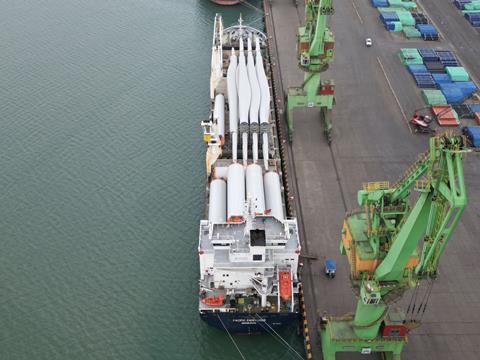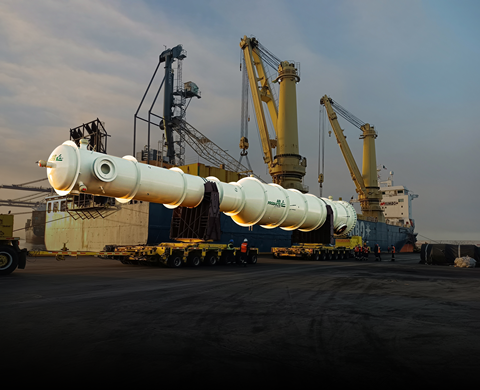Project forwarders report strong industry fundamentals around the globe. The major challenge: keeping up with the demands.

Backed by a strong team of project logisticians and a firm market, Trans Global Projects Group (TGP) managing director Colin Charnock painted an overwhelmingly positive picture of the project logistics market, who spoke with HLPFI at the Breakbulk Americas exhibition at the end of September. While discussions there focused on the US market, which has been enjoying a period of growth of late, Charnock emphasised that “everyone and everywhere is doing well” and “the way to describe it is, buoyant all over.”
Jake Swanson, vice president industrial projects at DHL Global Forwarding was equally positive. “The last couple of years have been very active in the project logistics market. Post-covid conditions created a market where project owners were ready to invest and move forward on previously postponed and new projects. The strong price of oil as well as other commodity prices also contributed to increased activity in the oil and gas and mining sectors. We continue to see more and more project opportunities in the renewable wind and solar space and the focus on regionalisation or nearshoring have also contributed to growth in the semi-conductor and technology sectors.”
In the Americas, he identified mining as a particularly active sector, especially with regards to lithium. Moreover, he added: “The technology sector and everything continues to be a growing sector. LNG projects in the US Gulf and Mexico also continue to be strong. For DHL Industrial Projects, we know that we have the personnel and experience within the region to cover these growing sectors.”
A strong region for TGP is Central Asia. It serves the markets there from its base in Azerbaijan, where it has had a presence for 30 years. The centre of the company’s Caspian operations, TGP continues to be active in the country, cementing its position as the market leader in Azerbaijan. While the region is not without competition, Charnock is confident about the business prospects. A longstanding contract with an oil supermajor brings a steady stream of work.
Kazakhstan and Uzbekistan are countries with a lot of project activity on the horizon, with the latter seeing a flurry of wind, solar and oil and gas projects. Kazakhstan, meanwhile, has opened up slightly. “Companies no longer have to be Kazakh owned to be there, so it has relaxed a bit,” said Charnock when asked about the potential to re-open an office there.
It is not just Central Asia that is enjoying a flurry of activity. Charnock said: “I could reel off five countries off the top of my head that have so many opportunities. You could go anywhere. Suriname, Guyana, Chile, Namibia – Shell and Total had huge finds there and there will be huge developments on a similar scale to Mozambique, so Namibia is definitely one to watch – Finland too is a large manufacturing market, with the likes of Metso or Wärtsilä… there is a lot going on.”
As Namibia emerges as another area of massive oil and gas potential, activity in Mozambique is also set to restart. After being put on hold in April 2021, TotalEnergies has said that the massive LNG developments in the country could restart before year end, although other media reports suggest a 2024 date.
As for Guyana, there are numerous developments ongoing to support the country’s rapid rate of growth. At Breakbulk Americas, project forwarder Bertling Logistics confirmed its joint venture with Rafeek & Moore to target the project logistics market there. The primary purpose of Rafeek & Moore Bertling Logistics (Guyana) will be to jointly explore the various business opportunities available in Guyana’s oil and gas, mining and construction sectors, and to add the value-added services and structure of both companies to a dedicated logistics service offering.
The venture will be led by Colin Moore of Rafeek & Moore and Bertling’s Steve Ross-Munro. Moore knows the Guyanese market inside out, having worked in the country for over 30 years. He is well connected, knows all the local suppliers and has access to local resources, vehicles and equipment to transport events to the remotest corners of the country. Ross-Munro, meanwhile, has been part of the global logistics business for more than 30 years and has worked and lived in UK, Middle East, Asia and the USA. He joined Bertling Logistics in Houston earlier this year as director of business development and has known Moore for several years.
Colin MacIsaac, ceo of Bertling Logistics, said: “Guyana and the surrounding countries have been on our radar for years and our global team is excited about the new business opportunities that are emerging in the country. Rafeek & Moore’s skilled team, high quality local services and extensive local network are well known in Guyana. We are confident that our new joint venture will establish a leading position in Guyana and that we will be ideally positioned to adequately respond to and serve the logistics needs arising from the ongoing energy transition.”
For TGP, it has become more involved in North America again recently – “an area that has been mixed for us in the past,” Charnock noted. He put this down to getting the right people in place. “We had tried with Europeans or Brits and it hasn’t succeeded. But now we have an A-team.” This includes the appointment of Drew Roberts as its executive vice president, North America in January; Chris Hartman as vice president of operations, North America, in May; and Nikki Tarver as vice president, business development for its Houston division in August.
Charnock stressed: “We have been on a real recruitment drive of people we know and it has transformed the operations there. It is all about the people and the local knowledge.”
In a similar vein, Renato Mello was bought in as managing director of TGP Brasil late last year with more than a decade of industry experience serving in senior positions in business development and project management. Charnock attributes the company’s successes in all the regions it operates to selecting the right people in the right places.
Swanson noted that project forwarders “continue to have a need to add to or grow their teams in order to keep up with customer’s demands as well as a growing industry”. He said: “Project forwarders need to be building their teams and positioning themselves to handle the current circumstances as well as preparing their teams for the future. This means bringing in new blood into the industry and training them to be the next project managers and experts of the future.”

To support those goals, DHL Industrial Projects developed a NextGen IP programme for recruiting new college graduates into the organisation and then putting them through an extensive two-year training schedule.
As DHL Industrial Projects explores new project markets – for instance, the technology sector, the new opportunities emerging from the continual expansion of the renewables sector as well as green hydrogen and other sustainability projects – Swanson said it creates specific strategies. “Depending on the circumstances, we may look to pull in expertise directly from those growing new markets in order to better understand our customers, their needs and what service that sector requires.”
A worrying trend highlighted by Swanson was EPCs and OEMs continuing to look for expertise on their teams, often recruiting personnel from the freight forwarding side of the business.
He also noted that environmental sustainability continues to be a growing and important topic. “Customers want to align their goals with DHL or their other partners and look for opportunities to accomplish sustainability goals together. This is a strength for DHL as we have a robust sustainability programme and plan, as well as tools for tracking our carbon footprint and tracking our progress.”
DHL Group’s goal is to reduce all logistics-related emissions to zero by the year 2050. “It is in this context that a global service provider with the ability to deliver carbon transparency and reduction solutions offers customers a genuine competitive advantage,” said Swanson. “Our DHL GoGreen Solutions portfolio offers various levels of carbon transparency tools and helps to find improvement areas to optimise the carbon efficiency of your supply chain and reduce your environmental impact.”
While other project forwarders suggested that clients are increasingly requesting lengthy adocumentation of their supplier’s environmental sustainability records, Charnock believes that this “is not universal… it varies. We can see it creeping in more, but it is not a tsunami. We are ready for it.”
One chink in the armour, Charnock noted, is in the contracting. “The payment terms are poor,” he said, sometimes extending to 120 days. While payment terms are a long-time headache for project forwarders, it seems to have slightly worsened in recent years with the forwarders taking on the de-facto role of a bank loan. “But on the other hand,” Charnock suggested, “that is an added value that we as forwarders can offer. If they go direct to shipping lines, for instance, they do not offer credit. That is added value we offer… but it is being relied on too heavily.”
Despite the heady profits among the energy majors, Charnock said that price is paramount still. “They are still squeezing every last cost, but it has its limits,” he explained. “If it gets to a point that we won’t be able to operate to the level expected by the client, we opt out. The risk to the standards of operations must be kept and we also have to make a profit.” Perhaps a benefit of the buoyant project market, is the ability to be selective. “We may be higher [in price] and then we do allow pressure to come down, but we also see now that we can push back slightly and say, ‘okay we have reached that limit’”.
Those are minor concerns for Charnock, who stressed that the overall picture is one of optimism. The pipeline is robust and whether it is mining, oil and gas, renewables, there is an upbeat mood about the industry. He conceded that it is hard to keep up with all the developments but relished in the relief that “we are not concerned about the future. We are optimistic and certainly with the strong team that we have”.
Swanson agreed. “The project pipeline for 2024 looks to be quite strong, especially in the Americas region. It is also quite balanced with renewable projects coming online all over the region, including a lot of solar projects. Oil and gas continues to be strong on all sides, whether it is oilfield equipment and services (OFS) business, offshore projects or turnaround projects, next year looks to be a busy and active year. The same can be said for mining and tech sectors… The challenge will be preparing and positioning your teams for the opportunities that come forward.”















